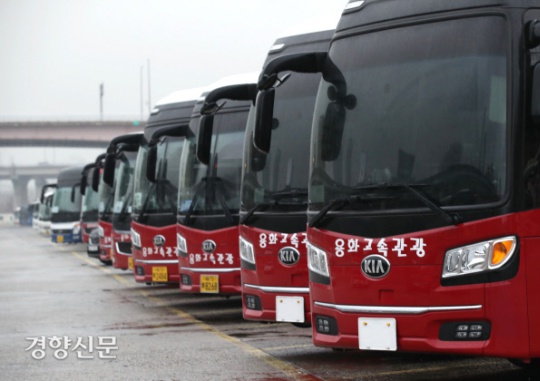The Economy Shrunk -1% Last Year, Hanging on with Fiscal Spending
이 글자크기로 변경됩니다.
(예시) 가장 빠른 뉴스가 있고 다양한 정보, 쌍방향 소통이 숨쉬는 다음뉴스를 만나보세요. 다음뉴스는 국내외 주요이슈와 실시간 속보, 문화생활 및 다양한 분야의 뉴스를 입체적으로 전달하고 있습니다.
[경향신문]

Last year, when COVID-19 swept through the world, the South Korean economy recorded negative growth for the first time in 22 years since the Asian financial crisis. However, exports performed well, growing for the second consecutive quarter. The Bank of Korea forecast the nominal gross national income (GNI) per capita to reach somewhere around US$31,500 in 2020, a decrease from 2019.
On January 26, the central bank announced that the real gross domestic product (GDP) for the fourth quarter last year grew 1.1% from the previous quarter. Thus last year’s annual growth rate was -1.0%. This is the first time that the economy made a negative annual growth since the Asian financial crisis in 1998 (-5.1%), and only the third time in the nation’s history when including the -1.6% growth in 1980.
The government increased fiscal spending significantly to respond to the crisis and exports are making a steep rebound since the third quarter, but it was still not enough to make up for the COVID-19 shock including reduced private consumption. Last year, government spending increased 5.0%. Meanwhile, private consumption decreased 5.0% and exports also fell 2.5% last year. Park Yang-su, director of economic statistics at the Bank of Korea explained, “Government spending continued to increase and capital investment also increased, but the contribution of domestic demand recorded negative figures and net exports also contributed less to economic growth.”
However, a closer look at each quarter showed that the economy receded in the first (-1.3%) and second (-3.2%) quarters last year and made a rebound in the third (2.1%) and fourth (1.1%) quarter. Exports, led by semiconductors and chemicals, increased by 5.2% in the fourth quarter last year, compared to the previous quarter, and investment in construction also made a surprise increase of 6.5%.
The impact that the novel coronavirus had on last year’s economic growth is estimated to be on par with the impact of the global financial crisis in 2008.
Park said, “The economic growth from the fourth quarter of 2008 until the third quarter the following year, when it received a direct blow from the financial crisis, was -1% compared to the same period the previous year,” and added, “It (the impact from COVID-19) can be seen as similar to the financial crisis.”
Copyright © 경향신문. 무단전재 및 재배포 금지.
- 야당 “탄핵된 대통령도 이 정도는 아니었다”…‘국정 옳다’는 윤 대통령 비판
- [이기수 칼럼] 윤석열과 지는 벚꽃이 닮았다
- 르세라핌 김채원 ‘손가락욕’ 영상 올랐다 삭제···‘실력논란’ 가중
- 여성만 수영복 입고 뛴다?…다시 불거진 스포츠계 성차별 논란
- “노인 최저임금 주지 말자는 국민의힘 서울시의원들···가당치 않다”
- 홍준표 “살다보니 개가 사람 비난하는 것 본다”···김경율 저격
- 고민정, 윤석열 정부 차기 총리 “하려는 여당 인사들이 거의 없을 것···레임덕 시작”
- 세월호 10주기 추도사 중 눈물 보인 김동연…“10번째 봄, 달라지지 않는 대한민국 부끄러워”
- 8명만 반기 들면 ‘개헌 저지선’ 붕괴…국민의힘 비주류 세력화 촉각
- 10년 전 너를 따라···네가 없이 떠난 여행 [플랫]